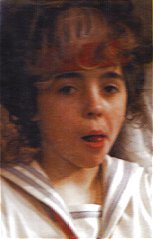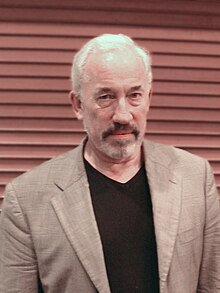Four Weddings and a Funeral is a 1994 British romantic comedy film directed by Mike Newell. It was the first of several films by screenwriter Richard Curtis to feature Hugh Grant. It was made in six weeks and cost under £3 million, becoming an unexpected success and the highest-grossing British film in cinema history at the time, with worldwide box office in excess of $245.7 million, and receiving an Academy Award nomination for Best Picture.
Plot

The film follows the adventures of a group of friends through the eyes of Charles (Hugh Grant), a good-natured but socially awkward Briton, who is smitten with Carrie (Andie MacDowell), an American whom Charles repeatedly meets at four weddings and at a funeral.
The first wedding is that of Angus (Timothy Walker) and Laura (Sara Crowe), at which Charles is the best man. Charles and his collection of single friends wonder if they will ever get married. At this wedding, Charles meets Carrie for the first time and spends the night with her. Carrie teases him by pretending that, now they have been to bed together, they will also have to get married, to which Charles endeavours to respond before realising she is joking. She then goes back home to America, observing that they may have missed an opportunity.
The second wedding is that of Bernard (David Haig) and Lydia (Sophie Thompson), a couple who got together at the previous wedding. Charles is happy to discover that Carrie is attending the wedding, until she introduces him to her fiancé, Sir Hamish Banks (Corin Redgrave), a wealthy politician from Scotland. At the reception, Charles finds himself seated at a table with several ex-girlfriends who relate embarrassing stories about his inability to be discreet and afterwards bumps into Henrietta (Anna Chancellor), known among Charles' friends as "Duckface", with whom he had a particularly difficult relationship.
As the evening wears on, Charles finds himself in an empty hotel suite, sadly watching Carrie and Hamish leave in a taxicab, only to be trapped in a small cupboard after the newlyweds suddenly stumble into the adjoining room to have sex. After Charles awkwardly exits the room, Henrietta confronts him about his habit of "serial monogamy", telling him that he is afraid of letting anyone get too close to him. Shortly after this encounter, Charles runs into Carrie (without her fiancé), and they end up spending another night together.
A month later, Charles receives an invitation to Carrie's wedding, in Scotland. While shopping for a present in London, he accidentally bumps into Carrie in a shop and ends up helping her select her wedding dress. Carrie also astonishes him with a list of her more than thirty sexual partners (he learns he is #32). He later tries to confess his love to her and hints that he would like to have a relationship with her. However, he says it rather lamely, and the confession obviously comes too late.
The third wedding is that of Carrie and Hamish at a Scottish castle. Charles attends, depressed at the prospect of Carrie's marrying Hamish. As the reception gets under way, Gareth (Simon Callow) instructs his friends to go forth and seek potential mates; Fiona's brother, Tom (James Fleet), stumbles through an attempt to connect with a woman until she innocently reveals that she is the minister's wife, while Charles's flatmate, Scarlett (Charlotte Coleman), strikes up a conversation with a tall, attractive American named Chester. As Charles watches Carrie and Hamish dance as husband and wife, Charles's friend Fiona (Kristin Scott Thomas) deduces his feelings about Carrie. When Charles asks why Fiona is not married, she confesses that she has always loved Charles since they first met years ago. Charles is appreciative and empathetic but does not requite her love. During the groom's toast, Gareth dies suddenly of a heart attack.
The funeral is that of Gareth. At the funeral, Gareth's partner Matthew (John Hannah) recites the poem "Funeral Blues" ("Stop all the clocks...") by W. H. Auden, commemorating his relationship with Gareth. After the funeral, Charles and Tom have a discussion about whether hoping to find your "one true love" is just a futile effort and ponder that, while their clique have always viewed themselves as proud-to-be-single, Gareth and Matthew had in fact been a "married" couple among them all the while.
The fourth wedding takes place ten months later, and is that of Charles, who has decided to marry Henrietta. However, moments before the ceremony, Carrie arrives at the church and reveals to Charles that she and Hamish are no longer together. Charles has a crisis of confidence, which he reveals to his deaf brother David (David Bower) and Matthew. At the altar, when the vicar asks if anyone knows a reason why the couple should not marry, David asks Charles to translate for him, and says in sign language that he suspects the groom is having doubts and loves someone else. The vicar asks whether Charles does love someone else, and Charles replies, "I do." Henrietta punches Charles, bringing the wedding to an abrupt halt.
Carrie visits Charles afterward to apologise for coming to the wedding. Charles confesses that, while standing at the altar, he realised that for the first time in his life he totally and utterly loved one person, "and it wasn't the person standing next to me in the veil." Charles makes a proposal of lifelong commitment without marriage to Carrie, saying, "Do you think not being married to me might maybe be something you could consider doing for the rest of your life?" Carrie responds by saying, "I do."
The song "Chapel of Love" is then played as we see Henrietta marrying an officer in the Grenadier Guards, David marrying his girlfriend Serena (Robin McCaffrey), Scarlett marrying Chester, Tom marrying his distant cousin Deirdre (whom he met, for the second time in 25 years, at Charles's wedding and instantly fell for), Matthew with a new partner (Duncan Kenworthy), Fiona marrying Prince Charles, and Charles and Carrie with their son (apparently unmarried).
Cast
Production

The film was shot mainly in London and the Home Counties, including Hampstead, Islington where the final moments take place on Highbury Terrace, Greenwich Hospital, Betchworth in Surrey, Amersham in Buckinghamshire, St Bartholomew-the-Great (wedding #4) and West Thurrock in Essex. Exterior shots of guests arriving for the funeral were filmed in Thurrock, Essex overlooking the River Thames with the backdrop of the Dartford River Crossing and at stately homes in Bedfordshire (Luton Hoo for wedding two reception) and Hampshire. Many of the extras were recruited by Amber Rudd who is described in the credits as "Aristocracy Co-ordinator"â€"among those used were Lords Burlington and Woolton.
Music
The original score was composed by British composer Richard Rodney Bennett. The movie also featured a soundtrack of popular songs, including a cover version of The Troggs' "Love Is All Around" performed by Wet Wet Wet that remained at number 1 in the British charts for fifteen weeks and was then the ninth (now twelfth) biggest selling single of all time in Britain. This song would later be adapted into "Christmas Is All Around" and sung by the character of Billy Mack in Richard Curtis' 2003 film Love Actually, in which Grant also stars. The soundtrack also features Elton John's "Crocodile Rock", "But Not for Me", and "Chapel of Love", and Gloria Gaynor's "I Will Survive".
Reception
Critical response
The film was very well received with critics, currently holding a 95% "Certified Fresh" approval on reviews aggregator Rotten Tomatoes, with the site's consensus stating, "While frothy to a fault, Four Weddings and a Funeral features irresistibly breezy humor, and winsome performances from Hugh Grant and Andie MacDowell."
Film critic Roger Ebert gave the film three-and-a-half stars out of four, calling it "delightful and sly", and directed with "light-hearted enchantment" by Newell. He praised Grant's performance, describing it as a kind of "endearing awkwardness".
The film did have its detractors, though. Writing for the Chicago Reader, Jonathan Rosenbaum called the film "generic" and "standard issue", stating that the audience shouldn't "expect to remember it ten minutes later".
Time magazine writer Richard Corliss was less scathing, but agreed that it was forgettable, saying that people would "forget all about [the movie] by the time they leave the multiplex," even joking at the end of his review that he had forgotten the film's name.
Box office
Upon its North American limited release on 11 March 1994, Four Weddings and a Funeral opened with $138,486 in 5 theatres. But upon its wide release on 15 April 1994, the film topped the box office with $4,162,489. The film would continue to gross $53,700,832 in North America with an additional $193Â million internationally, earning $246,700,832 worldwide.
Accolades
.jpg/200px-Richard.Curtis(London_1999).jpg)
Wins
Nominations
Recognition
The film was voted the 27th greatest comedy film of all time by readers of Total Film in 2000. In 2004, the same magazine named it the 34th greatest British film of all time. It is number 96 on Bravo's "100 Funniest Movies".
See also
- Notting Hill (1999), also written by Curtis and starring Grant
- Love Actually (2003), another film by Curtis starring Grant and Atkinson
- Black Versace dress of Elizabeth Hurley, worn by Hurley to the film's premiere
References

External links
- Four Weddings and a Funeral at the British Film Institute's Film and TV Database
- Four Weddings and a Funeral at the Internet Movie Database
- Four Weddings and a Funeral at the TCM Movie Database
- Four Weddings and a Funeral at AllMovie
- Four Weddings and a Funeral at Box Office Mojo
- Four Weddings and a Funeral at Rotten Tomatoes

